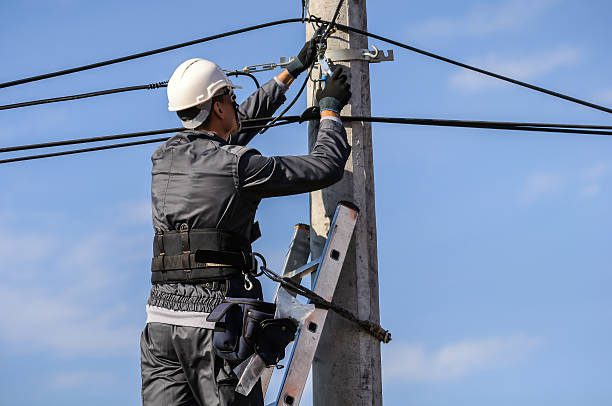
| Cable Technician Key Stats | |
|---|---|
| Avg. Salary / year | $58,940 |
| Avg. Pay / hour | $28.34 |
| Education | 1-2 Years |
| Job Outlook | 0% |
Cable Technicians are professionals who are experienced in installing, maintaining, troubleshooting and repairing cable television service to residential areas and homes.
Cable Technicians are important in providing year round entertainment for many family homes throughout.
Using an in depth background in technology and a heavy reliance on working with customers, Cable Technicians use these skills to provide a service to many consumers.
Individuals interested in this career may learn more information on how to enter this profession below.
Table of Contents
Education Requirements to Become a Cable Technician
Educational requirements vary for individuals who want to become a Cable Technician .
Some employers look for individuals with a high school diploma and a set of characteristics that will help them succeed in this profession.
In addition, there are some postsecondary programs that provide the education needed to enter this field.
Individuals who want to become a Cable Technician must have a minimum of a high school diploma.
These individuals will qualify for entry level positions, but must also have a set of skills and qualities to help them succeed in this profession.
Some helpful skills include the following:
- Troubleshooting skills: being able to distinguish when a repair needs to be done
- Mechanical skills: Familiarity with mechanical devices and the ability to install and repair them; also, familiarity with hardware tools
- Dexterity: Good hand eye coordination is needed to repair small equipment and devices; individuals must also work well with their hands
- Customer Service skills: Being able to communicate well as many technicians work from residential homes.This also aids in educating clients on how to use equipment in case some clients are not familiar working with technology
Individuals who opt to attend a postsecondary program, can attend a community college or technical school to learn how to become a Cable Technician.
These programs will offer the necessary training needed to enter this profession.
Individuals attending a postsecondary school may focus on a two year program such as: telecommunications, electronics or computer technology.
Common courses in this area of study may include: telecommunications, computer science or electronics.
Completing a program in telecommunications, electronics or computer technology leads to an associate’s degree.
Cable Technician Job Description
Cable Technicians are responsible for installing, troubleshooting, repairing and maintaining the cable lines needed to provide this service to a building.
Cable Technicians may install cable lines in a variety of buildings such as office, private homes or new structures being built such as apartment complexes.
When first installing cable, a Cable Technician will observe the home to determine whether an alternative service has already been installed.
Working off that information, a Cable Technician will then install, reposition or replace cable hardware.
After installing, they will test the cable line to determine whether it is functioning and inspect the service equipment and wiring.
After the installation and testing is done, they will make any repairs to defective, damaged or faulty equipment.
After troubleshooting and making repairs, they will retest the equipment to determine whether it is now functioning properly.
Cable technicians will also run calibrations to improve cable performance, write notes on any repairs and installations and provide information on how the equipment works to consumers.
Because Cable Technicians primarily work from residential homes while residents are there, they also have to maintain a professional demeanor and explain thoroughly how equipment works.
They may also provide more in depth information for clients who are not technologically savvy.
Cable Technician Salary and Career Path
The median annual salary for Cable and other subscription programming professionals, including Cable Technicians was approximately $49,270 in 2012.
Depending on the organization they work in, Cable Technicians mainly work full time and provide services in shifts including days, nights, weekends and sometimes holidays.
The job projection for the Telecommunications Equipment Installers and Repairers, which includes the Cable Technician profession, is expected to increase by 4 percent through the year 2022.
This growth is considered slower than average and is impacted by the demand for internet use.
However, some cable providers also provide bundles that include cable and internet and the projection for this exact service will differ.
Individuals interested in a career as a Cable Technician have many ways to begin this career.
There are many perks including working directly with people as well as working hands on with technology.
With the demand for internet increasing, individuals in this career may also broaden their skills to learning how to install internet connections as well.
![]() The below information is based on the 2021 BLS national averages.
The below information is based on the 2021 BLS national averages.
National Average Salary
$60,350Average Salary by State
| State | Avg. Annual Salary |
|---|---|
| Alabama | $58,940 |
| Alaska | $86,630 |
| Arizona | $60,740 |
| Arkansas | $49,840 |
| California | $67,280 |
| Colorado | $65,310 |
| Connecticut | $68,320 |
| Delaware | $54,940 |
| District of Columbia | $72,590 |
| Florida | $52,570 |
| Georgia | $59,550 |
| Hawaii | $64,470 |
| Idaho | $56,520 |
| Illinois | $60,160 |
| Indiana | $49,730 |
| Iowa | $55,160 |
| Kansas | $54,680 |
| Kentucky | $58,680 |
| Louisiana | $61,000 |
| Maine | $64,270 |
| Maryland | $61,510 |
| Massachusetts | $79,460 |
| Michigan | $56,060 |
| Minnesota | $59,000 |
| Mississippi | $61,250 |
| Missouri | $57,950 |
| Montana | $59,510 |
| Nebraska | $58,820 |
| Nevada | $53,050 |
| New Hampshire | $72,320 |
| New Jersey | $64,670 |
| New Mexico | $57,770 |
| New York | $73,620 |
| North Carolina | $57,850 |
| North Dakota | $64,810 |
| Ohio | $60,790 |
| Oklahoma | $51,820 |
| Oregon | $62,250 |
| Pennsylvania | $62,000 |
| Rhode Island | $73,350 |
| South Carolina | $53,330 |
| South Dakota | $58,280 |
| Tennessee | $55,810 |
| Texas | $53,930 |
| Utah | $60,970 |
| Vermont | $67,450 |
| Virginia | $60,220 |
| Washington | $63,560 |
| West Virginia | $58,110 |
| Wisconsin | $57,420 |
| Wyoming | $66,280 |
| Puerto Rico | $30,770 |
| Virgin Islands | $50,490 |
The top earning state in the field is Alaska, where the average salary is $86,630.
These are the top 5 earning states in the field:
* Employment conditions in your area may vary.
Frequently Asked Questions
What does a cable technician do?
Cable technicians install, maintain and replace cable television and internet services.
They can work with drop lines that provide cable access to only one home or with feeder lines that give access to the internet or television for multiple homes.
Experienced cable technicians may also work on the mainline for internet or cable service, called trunk line.
A cable technician’s job duties often include inspecting the lines, repairing poles, and they may also have to drive vehicles to work.
As a cable technician, you will need a variety of skills, including mechanical skills, dexterity, physical strength, and communication skills.
How much does a cable technician make?
Salaries vary depending on the field of employment and the worker’s level of experience.
According to the Bureau of Labor Statistics, the median annual wage for telecommunications line installers and repairers was $58,280.
As a cable technician, you can make anywhere between less than $35,000 and more than $90,000 a year.
How much does it cost to become a cable technician?
Cable technicians typically need at least a high school diploma but some of them have also completed some post-secondary training offered by a technical school or community college.
You can find entry-level employment in the field with a high school diploma and get the chance to learn hands-on the technical skills needed for the job.
If you choose to seek post-secondary training you can focus on telecommunications, electronics or a related field.
Costs vary widely depending on the school and the program you choose.
For example, a two-year associate’s degree in telecommunication will cost you, on average, around $20,000 a year.
You can also seek voluntary certification through associations such as the Fiber Optics Association.
What is the demand for cable technicians?
According to the Bureau of Labor Statistics, the demand for telecommunications line installers and repairers is expected to show little or no change in the following decade.
Employment growth for telecommunications line installers is expected to be tempered by the fact that consumers increasingly prefer wireless and mobile services.
Work opportunities vary depending on the region and the technician’s education and expertise.
Job opportunities are expected to be better for cable technicians who hold an associate’s degree and a certificate from an association such as the Fiber Optics Association.
How long does it take to become a cable technician?
Cable technicians need at least a high school diploma and in order to have better job prospects, you should also complete an associate’s degree program in telecommunication or a related field.
Associate’s degree programs can typically be completed in 2 years.
Those who attend a post-secondary program usually choose to specialize in telecommunications, electronics or a related field.
Education requirements vary depending on the employer and holding a high school diploma and having the skills needed to do this job may be enough for entry-level employment; however, in order to have better job prospects, you should also hold an associate’s degree or diploma in a related field.













